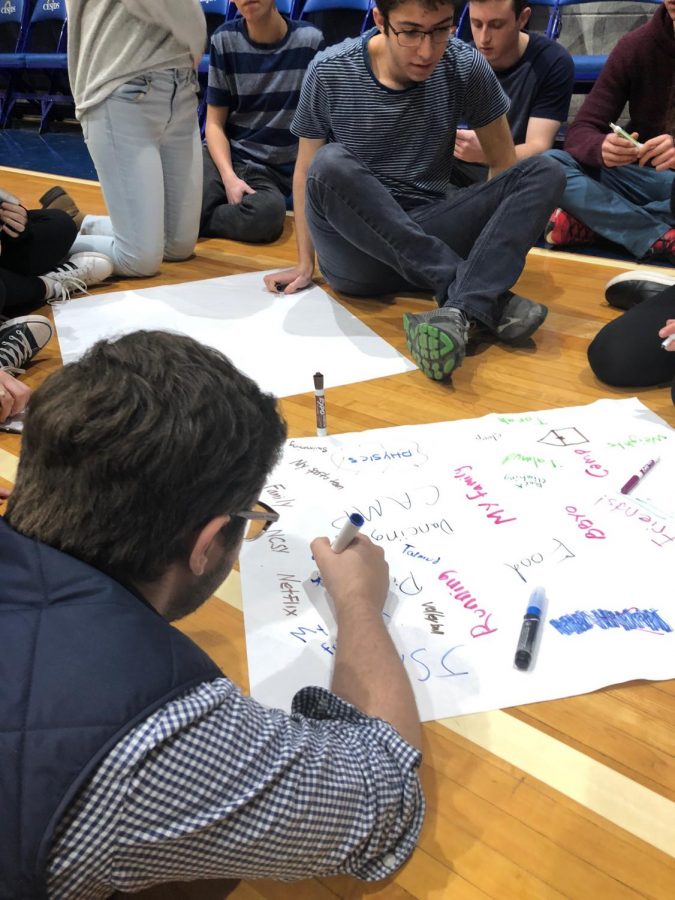Umttr holds assemblies on mental wellness in wake of tragedies in Montgomery County
During the workshop, juniors write down what makes them feel supported. Umttr strives to raise awareness about mental health through activities that come to some sort of positive conclusion, such as this one.
December 12, 2017
Following recent tragedies throughout the Montgomery County area, the umttr organization held mental health workshops for all CESJDS Upper School grades on Tues., Dec. 5 and Wed., Dec. 6.
The umttr workshops had been scheduled in advance, but coincidentally were held after two suicides shook the Montgomery County area during the week of Nov. 27. The tragic deaths of a sophomore at Walt Whitman High School and a junior at Walter Johnson High School sparked an outpouring of support on social media from students across the county.
The programs also came in the wake of the announcement that the death in May of then-seventh-grader Senesh Magill was the result of a prescription drug overdose. This announcement came in the form of a Dec. 5 Washington Post article written by Magill’s father.
According to Dean of Students Roslyn Landy, regardless of the tragedies that occurred in the community, mental health is always an important topic to address, and therefore the administration tries to hold mental wellness workshops every year.
“It is important to try to break the stigma, talk about mental illness and educate students about it,” Landy said. “Everyone at some point will know someone who suffers from a mental illness and it is important to understand.”
Landy specifically addressed the recent events in an email sent out to the high school students on Dec. 6, which summarized the point of the umttr event and offered support for families.
Susan Rosenstock, one of the founders of umttr, has visited JDS before to discuss mental health. She helped create the organization after her son, Evan Rosenstock, took his life in 2013. Rosenstock feels that following that tragedy, it was clear that she needed to work to “empower students to use their voices to help friends.”
Rosenstock led the sixth through eleventh grades in assemblies that lasted around an hour, and she held a shorter program for seniors. Instead of dwelling on the negative issues surrounding mental health, she instead led the students in more positive activities, such as ones where they had to write down things that make them feel supported.
“We believe in messages of hope, help, and strength, not sad, shocking, and traumatic. We honor and acknowledge current events, but the program focuses on positivity and building help-seeking behavior and resilience,” Rosenstock said.
In an attempt to create a positive attitude in assemblies for all grades, Rosenstock attempts to tailor her presentation to meet the needs of each age group present. For example, Rosenstock may use less harsh language or focus more on positive activities when working with younger kids.
Seventh-grader Coby Malkus felt that the activities during the assembly were too upbeat and therefore did not effectively address the mental health issues that have become increasingly prevalent in the last week.
“I thought it was going to be more talking about the suicides and seeing how we felt, and I just didn’t feel that [the assembly] connected that much in the end,” Malkus said. “I think it would have been better if we had just talked about [the suicides] and talked about what to do.”
Junior Seth Eisenstein, however, felt that the activities within the program allowed it to address the tragedies in the area while still remaining relatively uplifting.
“I thought it was effective, and I thought it was good at reminding everyone to look out for each other,” Eisenstein said. “Especially given the recent events, it was really important to have a program like this.”








